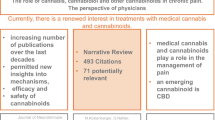Abstract:
Background: It is known from medical practise that patients and physicians can have positive experiences with little-researched and unapproved interventions. Under certain circumstances, effects even go beyond the placebo effect.
Method: Based on casuistics of chronic pain patients, the question of whether self-medication in the context of a good doctor-patient relationship can optimize the efficacy of cannabinoids and reduce dose and undesirable side effects is investigated. Using medicinal cannabis as an example, a new view on self-medication and medical support is proposed.
Results: The casuistics show that daily requirements (average of approximately 75 mg) for Δ9tetrahydocannabinol (THC) doses can be reduced. An unaccompanied and risky self-medication can be transformed into an effective therapy with significantly less medical cannabis. The approach consists of tracing the self-medication that has taken place to date and picking up the patient where he has "discovered" something for himself. The specific mode of action of cannabis in chronic diseases can be explained by mechanisms in the endocannabinoid system. Cannabinoids relieve patients in the context of stress, anxiety and depression, which are always involved in chronic diseases. In their physical as well as psychological sensations, patients are strengthened and eventually guided into self-efficacy.
Conclusions: If the patient has "discovered" cannabis as medicine for himself and can draw on positive experiences, something very powerful can emerge. In addition to the specific effects demonstrated by studies, there are non-specific effects or contextual factors at work that tend to be neglected in evidence-based medicine. These non-specific effects include, above all, those factors through which a patient gives a (subjective) meaning to a specific intervention. A new view on self-medication and medical support in chronic diseases is needed.
Zusammenfassung
Hintergrund: Erfahrungsmedizinisch bekannt ist, dass Patienten und Ärzte positive Erfahrungen mit nur wenig erforschten und nicht zugelassenen Interventionen machen können. Dabei gehen Wirkungen unter bestimmten Umständen über den Placeboeffekt hinaus.
Methode: Ausgehend von Kasuistiken chronischer Schmerzpatienten wird der Frage nachgegangen, ob durch Selbstmedikation im Kontext einer vertrauensvollen Arzt-Patienten-Beziehung die Wirksamkeit von Cannabinoiden optimiert werden kann und sich Dosis sowie unerwünschte Nebenwirkungen reduzieren lassen. Am Beispiel von Medizinalcannabis wird eine neue Sicht auf Selbstmedikation und ärztliche Begleitung vorgeschlagen.
Ergebnisse: Die Erfahrungen aus den Kasuistiken zeigen, dass sich der tägliche Bedarf (durchschnittlich ca. 75 mg) an Tetrahydrocannabinol(THC)-Dosen reduzieren lässt. Eine unbegleitete und risikoreiche Selbstmedikation kann in eine effektive Therapie mit deutlich weniger Medizinalcannabis transformiert werden. Die Vorgehensweise besteht darin, die bis dato stattgefundene Selbstmedikation nachzuvollziehen und den Patienten dort abzuholen, wo er selber für sich etwas "entdeckt" hat. Erklären lässt sich die spezifische Wirkweise von Cannabis bei chronischen Erkrankungen über die Mechanismen im Endocannabinoidsystem. Cannabinoide entlasten Patienten im Kontext von Stress, Angst und Depression, die bei chronischen Erkrankungen immer beteiligt sind. In ihrem körperlichen sowie psychischen Empfinden werden Patienten gestärkt und schließlich in die Selbstwirksamkeit geführt.
Schlussfolgerungen: Hat der Patient "Cannabis als Medizin" selbst für sich "entdeckt" und kann auf positive Erfahrungen zurückgreifen, so kann etwas sehr Wirkmächtiges entstehen. Neben den spezifischen Effekten, die durch Studien nachgewiesen werden, wirken unspezifische Effekte bzw. Kontextfaktoren, die in der evidenzbasierten Medizin eher vernachlässigt werden. Zu diesen unspezifischen Effekten gehören vor allem solche Faktoren, durch die ein Patient einem Wirkmittel eine (subjektive) Bedeutung gibt. Eine neue Sicht auf Selbstmedikation und ärztliche Begleitung bei chronischen Erkrankungen ist erforderlich.
Schlüsselwörter: Cannabinoide, Selbstmedikation, Endocannabinoidsystem, Placeboanalgesie, Valebo
Eingereicht am 12.8.2021 - Revision akzeptiert am 17.1.2022
Similar content being viewed by others
Literatur
Cannabismedizin und Straßenverkehr. Antwort der Bundesregierung auf eine Kleine Anfrage. Deutscher Bundestag, Drucksache 18/11701 vom 27.03.2017. https://dserver.bundestag.de/btd/18/117/1811701.pdf (zuletzt abgerufen am 14.1.2022)
Wendelmuth C, Gastmeier K. Hochdosisdronabinoltherapie vs. Medizinalcannabisblüten. Schmerz 2019;33:392-398. https://doi.org/10.1007/s00482-019-00402-7 (zuletzt abgerufen am 14.1.2022)
Russo EB. Clinical endocannabinoid deficiency reconsidered: current research supports the theory in migraine, fibromyalgia, irritable bowel, and other treatment-resistant syndromes. Cannabis Cannabinoid Res 2016;1(1):154-165. https://www.liebertpub.com/doi/10.1089/can.2016.0009 (zuletzt abgerufen am 14.1.2022)
Hill MN, Patel S. Translational evidence for the involvement of the endocannabinoid system in stress-related psychiatric illnesses. Biol Mood Anxiety Disord 2013;3(19):1-14. https://biolmoodanxietydisord.biomedcentral.com/articles/10.1186/2045-5380-3-19 (zuletzt abgerufen am 14.1.2022)
Grotenhermen F. Cannabinoide und das Endocannabinoidsystem. Cannabinoids 2006;1(1):11-16
Bundesärztekammer (Hrsg). Placebo in der Medizin. Deutscher Ärzte-Verlag, Köln 2011. https://www.bundesaerztekammer.de/fileadmin/user_upload/downloads/Placebo_LF_1_17012011.pdf (zuletzt abgerufen am 14.1.2022)
Interview mit Prof. Dr. Robert Jütte. Dtsch Arztebl 2010;107:28-29: A-1388 / B-1227 / C-1207. https://www.aerzteblatt.de/archiv/77600/Interview-mit-Prof-Dr-Robert-Juette-Vorstand-des-Wissenschaftlichen-Beirats-der-Bundesaerztekammer-(BAeK)-Die-Arzt-Patienten-Interaktion-ist-ganz-zentral (zuletzt abgerufen am 14.1.2022)
Andree M. Placebo-Effekte: Heilende Zeichen, toxische Texte, ansteckende Informationen. Verlag Brill | Fink, München 2018
Langer E. Mindfulness: Das Prinzip Achtsamkeit. Die Anti-Burnout-Strategie. Verlag Franz Vahlen GmbH, München 2015
Klinger R. Schmerz und Placebo. Deutsche Schmerzgesellschaft e.V. 2019. https://www.schmerzgesellschaft.de/patienteninformationen/besonderheiten-bei-schmerz/schmerz-und-placebo (zuletzt abgerufen am 14.1.2022)
Bingel U, Schedlowski M, Kessler H. Placebo 2.0 - Die Macht der Erwartung. rüffer & rub Sachbuchverlag, Zürich 2019
Schröder M, Schröder H. Sprache und Kommunikation als Therapeutikum - Plädoyer für den Vale(b)o-Effekt in der Heilkunde. Erfahrungsheilkunde 2019;04:217-224
Interview Prof. Dr. Matthias Keidel. Patientenmitsprache wirkt oft wie Placebo. Deutscher Schmerzkongress 2017. https://www.youtube.com/watch?v=pMTl0Ct2hCY (zuletzt abgerufen am 14.1.2022)
Walach H, Loughlin M. Patients and agents - or why we need a different narrative: a philosophical analysis. Philos Ethics Humanit Med 2018;13(1):1-7. https://peh-med.biomedcentral.com/articles/10.1186/s13010-018-0068-x (zuletzt abgerufen am 14.1.2022)
Author information
Authors and Affiliations
Corresponding author
Ethics declarations
Dr. med. Knud Gastmeier ist stellvertretender Sprecher der Ad-hoc-Kommission Cannabis der Deutschen Schmerzgesellschaft und Leiter der AG Cannabis des Berufsverbands der Ärzte und Psychologischen Psychotherapeuten in der Schmerz- und Palliativmedizin in Deutschland (BVSD). Er gibt Vortragstätigkeit für Bionorica, Ethic GmbH, Kyowa Kirin GmbH, Aurora Deutschland GmbH und Tilray Deutschland GmbH an. Prof. Dr. phil. Hartmut Schröder erklärt, dass keine Interessenkonflikte vorliegen.
Rights and permissions
About this article
Cite this article
Gastmeier, K., Schröder, H. Cannabis als Medizin, Aura und Valebo. MMW - Fortschritte der Medizin 164 (Suppl 6), 29–34 (2022). https://doi.org/10.1007/s15006-022-0768-4
Published:
Issue Date:
DOI: https://doi.org/10.1007/s15006-022-0768-4




